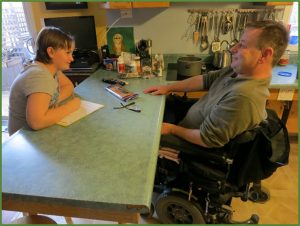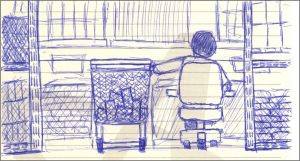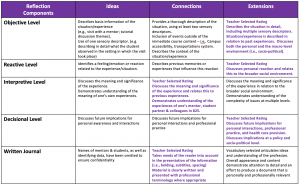8.5 Case Study

Bill Meyerman has lived with a spinal cord injury for the past 50 years since he was hit by a car at age five. He spent his childhood and teenage years living in a rehabilitation facility. After a career in social services, his occupation focused on raising his 2 daughters and assuming household responsibilities while his wife worked outside the home. “I am very frank with students and tell them about what is important to me. Politically correct language and labels aren’t helpful. Call me crippled or handicapped – I don’t really care. The rehabilitation I received as a youngster was about basic life skills and how to manage in the world as it is. I appreciate professionals who are honest and direct with me. I know that their expertise is valuable, but I will make my own decisions. Give me information and treat me with respect. I know myself and my needs best…and just call me Bill!”
Journal Entry

[Excerpt from student H’s reflective journal entry. Permission to use this excerpt has been received from my former student, who requested that this pseudonym be used.]
“What have those hands been through? How long can the grip keep on holding, how long can he hold out the weight that is forever piling? Stay strong those hands, don’t let go yet, there are still many aisles that you have to go down. If you feel tired though, we OT students are just behind you. Let us give you a hand.”
Journal Feedback
[Excerpt from Instructor’s final journal feedback review.]
December 2013
H: In the latter part of your journal, you reflected on past experiences of working in long-term care and the meaning of care in the greater sense of the word. Delving into past and current experiences and comparing/contrasting them in your journal appears to have led to new learning and ideas for your future practice. It also seems that you took the opportunity to engage in reflection in order to explore your own feelings and motivations for enrolling in this graduate degree…taking your reflection beyond the classroom and this course.
Your reflections of the 2nd and 3rd visits with your mentor were particularly poignant for me to read. They highlight two very different perspectives: “eating dinner with B and his family…is very much the same as it would be with any other family.” You may have anticipated ‘difference’ but what you experienced was similarity…a relevant observation. Yet the visit to the grocery store illuminated differences…as did your drawing of B as he maneuvered through the aisles.

Final Evaluation
[Excerpt from Student’s Final Performance Evaluation]
Student Name: H
Date: December 2013
Grade: Pass
Student’s Personalized Learning Outcomes: 1. To be able to articulate the difficulties that a person with spinal cord injuries goes through. 2. To learn what traits the mentor values in an occupational therapist. Evaluation of learning objectives: You have successfully addressed your learning objectives within the course, as evidenced in your journal entries and tutorial contributions.
Volunteer Feedback: “H demonstrated a genuine interest in our meetings. I would say he is analytical and likes a challenge. He had good questions and was respectful in his approach to me. He interacted well with me and with a friend who is also a wheelchair user. I found him to be sensitive and a really good student. I think he will do well in his profession.”
Journal Feedback: Your journal includes reflections at all levels of the reflection rubric. You provided honest and detailed comments. The latter half of your journal would benefit from additional organization…numbering pages and dating entries.
Tutorials: You were an active and engaged participant in the tutorial discussions, raising relevant issues and listening respectfully to the contributions of others.
Recommendations: I encourage you to continue to use journaling in future courses and fieldwork, as you are able to capture your learning in a creative and worthwhile manner.
It was a pleasure working with you in this course, H. Best of luck in your future endeavours.
[signature] Anne O’Riordan,
Instructor / Course Coordinator

Re
In Memoriam
Thank you to Mr. Bill Meyerman: a valued colleague, a talented mentor, my treasured friend (1963-2020).
References
Fostaty Young, S. & Wilson, R. (2000). Assessment and Learning: The ICE Approach. Portage & Main Press.
Jamieson, M., Krupa, T., O’Riordan, A., O’Connor, D., Paterson, M., Wilcox, S. (2006) Developing empathy as a foundation for client-centred practice: Evaluation of a university curriculum initiative. Canadian Journal of Occupational Therapy, 73(2), 76-85.
O’Riordan, A., Peterson, J., Murphy, S., Parsons, T., Docherty, D., Parsons, J., Meyerman, B. & Paterson, M. (2011) Collaboration in Action: Health Care Education, Academic Exchange Quarterly, 15(4): 94-99, Winter 2011. Collaboration in Action: Health Care Education.
Paterson, M., O’Riordan, A., Jamieson, M., O’Connor, D., Krupa, T., Wilcox, S. (2000) Community partnership project: curriculum innovation in an occupational therapy undergraduate program. Education Through Partnership Journal. 4(2), p. 7-15.
Sok Mui Lim, Bhing Leet Tan, Hua Beng Lim & Zi An Galvyn Goh. Engaging persons with disabilities as community teachers for experiential learning in Occupational Therapy Education. (2018) Hong Kong Journal of Occupational Therapy. 31(1). doi.org/10.1177/1569186118783877
Stanfield, Brian R. (2000) The Art of Focused Conversation.
Troop, M. & O’Riordan, A. (2017) The Patient as Mentor: Transformative Experience in an Occupational Therapy Course. Transformative Dialogues: Teaching & Learning Journal. 10 (3). November 2017 Online.

